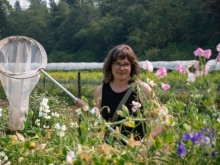Plant-pollinator interactions in human altered landscapes

RISA SARGENT
Faculty of land and food systems, University of British Columbia, Canada
Link to webinar: https://umontpellier-fr.zoom.us/webinar/register/WN_UDjFFly3R-Ktoo-PyQ5iRQ
Summary
The majority of plant species rely on animals for pollination – an intricate relationship that has fascinated biologists for centuries. Evidence is mounting that these critical relationships are at risk due to host of human-driven disturbances, including climate change, intensification of land use through agriculture and urbanization, and species invasions. What do we know about the drivers of plant-pollinator interactions and their vulnerabilities? In this talk I will describe research going on in our lab to uncover the connections between human disturbance and plant-pollinator interactions and the potential for management schemes and policies to mitigate their decline.
Recent publications:
1 Hyjazie, B. and R.D. Sargent. Floral resources predict the local bee community: implications for conservation. Biological Conservation, in press.
2 Sargent, R.D. and A.D. McKeough. New evidence suggests no sex bias in herbivory or plant defence. American Naturalist, in press.
3 Gaudreault, E.M. and R.D. Sargent. Effects of neonicotinoid seed treatments on wild bee populations in soy and corn fields in Ontario. Agricultural and Forest Entomology, in press.
Watch previous seminars on our YouTube channel: https://www.youtube.com/channel/UCrX4IsZ8WIFcDa0ZmC7rcQg
Contact du Comité SEEM: seem@services.cnrs.fr. Contact du Labex CEMEB: cemeb-gestion@umontpellier.fr


